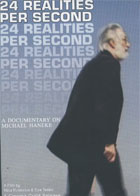
24 Realities per Second: A Documentary on Michael Haneke 2005
Distributed by Cinema Guild, 115 West 30th Street, Suite 800, New York, NY 10001; 212-685-6242
Produced by Nina Kusturica and Eva Testor
Directed by Nina Kusturica and Eva Testor
DVD-R, color, 57 min.
Sr. High - Adult
Film Studies
Date Entered: 04/05/2006
Reviewed by Oksana Dykyj, Head, Visual Media Resources, Concordia University, MontrealNina Kusturica, apparently a distant relative of the well-known film director Emir Kusturica, and her long-time collaborator on camera and direction, Eva Testor founded their own production company with their first project revolving around a film director Michael Haneke. Since Haneke had taught at the Vienna Film Academy where both women had been students, the familiarity between subject and filmmakers is apparent as when he plays to the camera, at one point good-humoredly thrusting a script right up to the camera/audience. Jean-Luc Godard’s now-famous dictum “The cinema is truth 24 frames per second” is borrowed for the documentary’s title, and yet right at the start of the film, Haneke adapts both Kustirica and Testor’s title as well as Godard’s dictum by saying, “I always say that film is 24 lies per second at the service of the truth or at the service of the attempt to find the truth.”
The question then becomes whether this documentary reveals the truth about Michael Haneke. The short answer is both yes and no. The liner notes provide information that is not evident in the film such as the fact that the filmmakers followed Haneke (on and off obviously) for a period of two and a half years. He is shown scouting for locations, arriving at one of his screenings where he diplomatically responds to rather pedestrian questions from the audience after the screening, and, as with every director, the questions almost always have to do with his intent in creating a specific meaning to which he, as most directors, replies that he wants spectators to find their own interpretation of the film. There is, as well, an overly long section where he is photographed by a press photographer and their rather clichéed interaction unfolds. All these sections show a director, almost a generic director, and could be edited together for a bonus materials featurette on any Haneke DVD. There are, however, a few revelatory sections which redeem this documentary and luckily place it back on track.
If one is not familiar with Haneke’s work, this documentary will not provide much background on how he has tended to develop characters whose repressed or suppressed emotions explode in stark aggression feeding the modern obsession with cinematic violence. In fact Haneke took home the Grand Prize at the 2001 Cannes Film Festival for The Piano Teacher, which also won the film’s stars Benoit Magimel and Isabelle Hupert, the Best Actor and Best Actress awards. If one is familiar with Haneke’s work, then several sections resonate clearly, particularly when he candidly discusses his first cinematic experiences as a child, and then later as a student, which produced breaks from illusion. In another section, after becoming particularly frustrated by an actress’ performance (the film is not identified by the filmmakers), he confesses that as a director he does less than he has imagined as an author, and brings up advice given him by his theatre director father about being happy if he achieves 40% of what he imagined.
There is certainly room for a sequel dealing more specifically with his thinking about his creative process and his feelings about the medium itself, having come from television and having shot his last film Caché digitally. There are many topics for him to potentially broach, but in this film we merely get a glimpse of what is there. I must also note that the DVD-R format can be problematic and not play on all DVD players, as this one failed to play on one of the machines on which I tested it.
This documentary is recommended as supplemental teaching or research material about the directorial work of Michael Haneke, a filmmaker who will undoubtedly have many more documentaries produced about him.